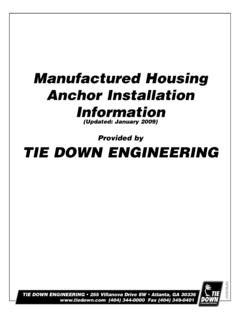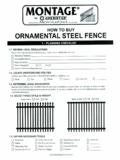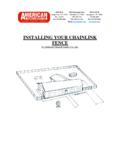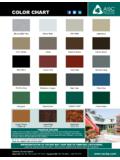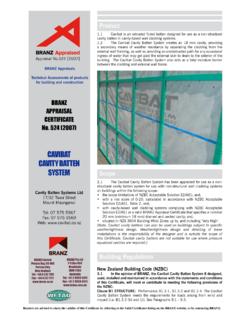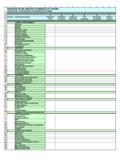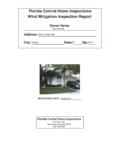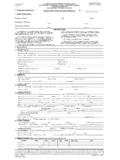Transcription of METAL ROOFING SYSTEM ORDERING & …
1 METAL ROOFING . SYSTEM . ORDERING &. INSTALLATION. SELF HELP. GUIDE. Due to product improvements, changes and other factors, Fabral reserves the right to change or delete information herein without prior notice or obligation to make changes in products previously purchased. Fabral, Inc 1. GRANDRIB 3 AND ALU TUFF. INSTALLATION GUIDELINES. Caution: Grandrib 3 and Alu Tuff ROOFING pan- els must be applied on a minimum roof pitch of 2 :12 or greater. Important Notice: This guide must be read in its entirety before beginning installation. Visit to watch product related instal- lation videos. This guide is supplied by FABRAL, Inc. for use by its customers, and is intended to be a guide only. This does not replace local or state build- ing codes. FABRAL, Inc. assumes no responsibility for any problems which might arise as a result of improper installation or any personal injury or property damage that might occur with the products use.
2 Note: Under certain conditions, panels may show waviness commonly referred to as oil canning. This is a characteristic of roll forming. Such oil canning will not be accepted as cause for rejection. In areas of high snow or ice accumulations, snow guards, or snow blocks, may need to be added to the METAL roof SYSTEM to reduce or eliminate snow or ice from cascading from a higher roof and damaging lower roofs, roof valleys, gutters, or objects on the ground. Check with your installer and local building codes as to the need of snow blocks or guards in your area and design appropriately. Fabral, Inc 2. MINIMUM RECOMMENDED. TOOLS & EQUIPMENT. Screw Gun 2,000 to 2,500 rpm Clutch type screw gun with a depth sensing nose piece is recommended to insure proper installation of the screws. The following bits will be required: 1/4 hex magnetic socket for #9 screws 5/16 hex magnetic socket for #14 screws Snips For miscellaneous panel and flashing cut- ting requirements.
3 Three pairs will be required: one for left edge, one for right edge, and one for centerline cuts. Electric Nibblers or METAL Shears Used for gen- eral METAL cutting, such as cutting the panels in hip and valley areas. Note: Some installers prefer using a circu- lar saw with a METAL cutting abrasive blade. This method may be faster, but it has some drawbacks: 1. Saw cut edges are jagged and unsightly and tend to rust more quickly than sheared edges. 2. Saw cutting produces hot METAL filings that can embed in the paint and cause rust marks on the face of the panel. 3. Saw cutting burns the paint & galvaniz- ing at the cut edge leading to the onset of edge rust. Chalk Line Used to assist in the alignment of panels, flashings, etc. Fabral, Inc 3. MINIMUM RECOMMENDED. TOOLS & EQUIPMENT. Caulking Gun Used for miscellaneous caulking and sealing to inhibit water infiltration.
4 Rivet Tool Used for miscellaneous flashing and trim applications. Hand Bending Tools Used to hand bend the ends of trim components to provide a neat, finished appearance. This tool is available from FABRAL. Marking Tools Indelible markers, pencils, or scratching tools. Scratch Awl Can be made from old screw driv- ers ground to a point. Used to mark the steel, open hems, and as a punch. Utility Knife Used for miscellaneous cutting. Electric Drill Used to drill holes such as those required for pop rivet installation. String Line Use for general alignment and measuring. Tape Measure 25 foot minimum (another at 50 foot is handy). Locking Pliers Standard and Duckbill style for miscellaneous clamping and bending of parts. Fabral, Inc 4. SAFETY. CONSIDERATIONS. Never use unsecured or partially installed panels as a working platform. Do not walk on panels until they are in place on the roof and all of the fasteners have been installed.
5 METAL ROOFING panels are slippery when wet, dusty, frosty, or oily. Do not attempt to walk on a METAL roof under these conditions. Wear- ing soft soled shoes will improve traction and minimize damage to the painted surface. Always be aware of your position on the roof relative to your surroundings. Take note of the locations of roof openings, roof edges, equipment, co workers, etc. Always wear proper clothing and safety at- tire. Wear proper clothing when working with sheet METAL in order to minimize the potential for cuts, abrasions and other injuries. Eye protection and gloves are a must when work- ing with sheet METAL products. Hearing pro- tection should be used when power cutting METAL panels. Use care when operating electrical and other power equipment. Observe all manufac- turer's safety recommendations. Roof installation on windy days can be dangerous.
6 Avoid working with sheet METAL products on windy days. Fabral, Inc 5. DELIVERY, HANDLING & STORAGE. Always inspect the shipment upon deliv- ery. Check for damage and verify material quantities against the shipping list. Note any damaged material or shortages at the time of delivery. Handle panel bundles and individual panels with care to avoid damage. Longer bundles and panels may require two or more pick points properly spaced to avoid damage that can result from buckling and/or bending of the panels. Store the panels and other materials in a dry, well ventilated area, away from traffic. Elevate one end of the bundle so that any moisture that may have accumulated during shipping can run off. Be sure that air will be able to circulate freely around the bundles to avoid the build up of moisture. Never store materials in direct contact with the ground. If possible, separate panels to allow air to pass between sheets to avoid white rust staining.
7 Wear clean, non marking, soft soled shoes when walking on the panels to avoid shoe marks or damage to the finish. Step only in the flat area of the panels. Fabral, Inc 6. ESTIMATING & ORDERING A ROOF. Step 1. A. Sketch a birds eye view of the roof and label each section (see example below.). H. F I. D. E. G B. C. A. B. Sketch a diagram of each roof section. Show all measurements (see example below.) It is important to measure exact center of the ridge to the eave edge. Do not allow anything for overhang. 16'. 8'. 6' 10'. H. 22'. 14'. 24'. F 18' 18'. 15' 40' I 10'. 30'. 12' 30'. 8' 8'. 6' 22'. 6' G 8' 15'. D 13' 15'. 14'. 23'. 13'. 15'. 18'. E 14' 15'. B 10'. 22'. 15'. C 22'. 12'. 10'. A. 18'. Additional Information Required: Roof Pitch, Sky- lights (Location & Size), Chimney (Location & Size), and Size and Number of Pipe Penetrations. Additional Identification: Ridge, Hips, Valleys, Gables, Etc.
8 Fabral, Inc 7. ESTIMATING & ORDERING A ROOF. Step 2. From the diagram you completed in Step 1, you are now ready to develop your ROOFING panel cut list. Each panel covers 36 of area so the only measurements you need are the distance from the eave to the ridge and the ridge length. You can then determine the number of panels needed by dividing the ridge length by the panel coverage. (See example Diagram A below.). DIAGRAM A . 25'. EAVE. GABLE. GABLE. Section A 12'. RIDGE. GABLE. GABLE. Section B 12'. EAVE. 25'. The length from the eave to the ridge is 12'. The length of the ridge is 25'; therefore, the number of panels to complete one side of the house is 25 3 = 9 pcs. Your materials list should look like Sample B on page 9. Fabral, Inc 8. ESTIMATING & ORDERING A ROOF. Step 2 (Cont.). SAMPLE B . Section A 9 pcs. X 12'. Now look at your roof diagram and figure out your next section of roof.
9 Refer back to Dia- gram A . Section B of this sample roof is the same as Section A. Your materials list should now look like Sample C below. SAMPLE C . Section A 9 pcs. X 12'. Section B 9 pcs. X 12'. If your home has hips or valleys, refer to Dia- gram 1A below. DIAGRAM 1A . 40'. EAVE. GABLE. Section A 10'. HI. 30'. P. RIDGE. GABLE. Section B 10'. VA. LL. EY. EAVE. 20'. RIDGE. EAVE. EAVE. GABLE GABLE. Fabral, Inc 9. ESTIMATING & ORDERING A ROOF. Step 2 (Cont.). Start with section A. The eave length is 40' and the ridge length is 30', with a difference of 10'. You will need 30 3 = 10 pcs. X 10' to reach the area where the valley starts. Remember that you have 10' remaining to cover the area. Calculate the length of each panel going into the valley by first determining the roof's pitch. Pitch is how much rise your roof has in inches for every foot of horizontal run.
10 Use the Hip and Valley Chart below to ensure you order the correct panel length for hips and valleys. For example, Diagram 1A is a 4/12 pitch (4/12p). According to the chart below, we know each panel will be 36 1/8 shorter. Since we are measuring from the longest point of the angle, your first piece will be the same length as the full eave to ridge measurement and each piece after will be 36 1/8 shorter. (Your list of Section A. should look like Sample D on page 11.). Hip & Valley Chart When determining the panel length needed for a hip or valley, the panel will either be shorter or longer as you go up or down the hip or val- ley. The chart below shows you the amount to add or subtract from each panel according to the pitch of your roof, for hips and valleys where the intersecting roof planes are at 90 to another, as in diagram 1A. 1/12p = 36 1/8 5/12p = 39 9/12p = 45.

